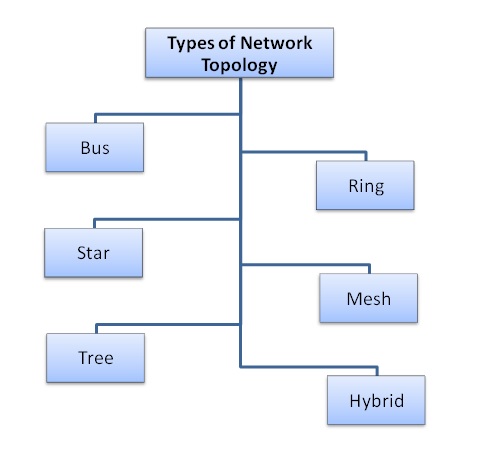
The following article provides detailed information about Different types of topology. In this description the types of topology covered is Bus Topology and Ring Topology along with advantages, disadvantages in detail.
Different types of topology:
What is network topologies?
In computer network, computers are connected in different ways using many devices. But the method of its data flow is called topology.
There are many nodes in it, which are connected by a line in different ways.
There are two types of topology:-
Physical and Logical
- Physical – In this topology, computers and devices are physically connected.
- Logical – The process of data flow in the network is called logical topology.
The network topologies are classified into following six types:
- Bus Topology
- Ring Topology
- Star Topology
- Mesh Topology
- Tree Topology
- Hybrid Topology
Following diagram shows types of network topologies:

1. Bus topology –
In bus topology, backbone cables are used to connect all computers and network devices.
At the start and end point of the cable, there is a special device called a terminator, which controls the signals.
In this, coaxial cable is used as backbone cable. It uses half-duplex and board cast technology to send data.
It is also called linear topology, it is mostly used in small networks.
Advantages of Bus topology
- Its installation is easy.
- Less cable is used in this.
- In this, any problem related to the network can be easily resolved.
- It costs less to install.
- If there is a fault in one node, then it has no effect on the other node.
Disadvantages of Bus topology
- When the backbone cable fails, the entire network stops working.
- No bigger network can be made than this.
- Broadcasting is used in this which affects the performance.
- Its speed is very less.
2. Ring topology –
In Ring topology each computer is connected to each other, and the first computer is connected to the last computer. Thus this ring shape is formed. So it is called ring topology.
In this, each computer has two neighboring computers. In ring topology, if any data wants to be sent from the first computer to the last computer, then that data has to pass through all the computers in the middle.
Therefore, to prevent data loss, repeaters are used in it.
Advantages of Ring topology
- In this, the transmission network is not affected by adding more nodes, because only the nodes having the token transmit the data.
- Its installation is cheap.
Disadvantages of Ring topology
- It is a difficult task to add or remove nodes.
- If one computer crashes, the whole network gets messed up.
- Its speed is less.
- No bigger network can be created than this.
Related Articles:
- Basic Accounting Concepts Part 1
bus topologybus topology diagrambus topology in computer networkdefine network topologydifferent types of topologynetwork topology diagramnetwork topology in computer networkring topologyring topology diagramstar bus topologytypes of network topologytypes of topologytypes of topology in computer network
Different types of topology | Types of topology
2022-11-25
Computer Basics
No Comments
Admin
The following article provides detailed information about Different types of topology. In this description the types of topology covered is Bus Topology and Ring Topology along with advantages, disadvantages in detail.
Different types of topology:
What is network topologies?
In computer network, computers are connected in different ways using many devices. But the method of its data flow is called topology.
There are many nodes in it, which are connected by a line in different ways.
There are two types of topology:-
Physical and Logical
The network topologies are classified into following six types:
Following diagram shows types of network topologies:
1. Bus topology –
Bus topology
In bus topology, backbone cables are used to connect all computers and network devices.
At the start and end point of the cable, there is a special device called a terminator, which controls the signals.
In this, coaxial cable is used as backbone cable. It uses half-duplex and board cast technology to send data.
It is also called linear topology, it is mostly used in small networks.
Advantages of Bus topology
Disadvantages of Bus topology
2. Ring topology –
In Ring topology each computer is connected to each other, and the first computer is connected to the last computer. Thus this ring shape is formed. So it is called ring topology.
In this, each computer has two neighboring computers. In ring topology, if any data wants to be sent from the first computer to the last computer, then that data has to pass through all the computers in the middle.
Therefore, to prevent data loss, repeaters are used in it.
Ring topology
Advantages of Ring topology
Disadvantages of Ring topology
Related Articles:
Some More: DBMS/ WT/ DMDW
bus topologybus topology diagrambus topology in computer networkdefine network topologydifferent types of topologynetwork topology diagramnetwork topology in computer networkring topologyring topology diagramstar bus topologytypes of network topologytypes of topologytypes of topology in computer network